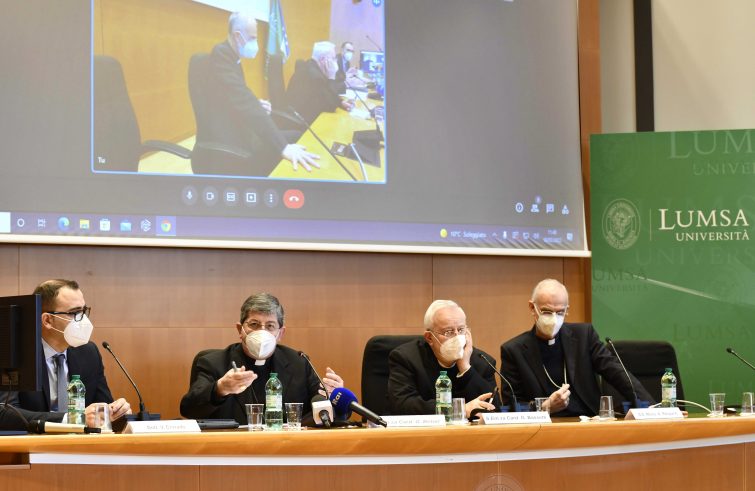
“The problems of the ‘Mare Nostrum’ should be addressed together”, said Cardinal Gualtiero Bassetti, Archbishop of Perugia-Città delle Pieve, in his address at Rome’s LUMSA University marking the presentation of the Meeting between Mayors and Bishops titled “Mediterranean, frontier of peace”, to be held next February 23-27 in Florence. “The crisis facing the Mediterranean requires a comprehensive, not short-sighted vision, as we are reminded by the Holy Father”, he added. His Eminence drew a parallel between the epoch of “saintly mayor” Giorgio La Pira, who inspired the initiative, and our days:
“Now as in the past, the Mediterranean remains a major theatre of social tensions, a crucible of situations encompassing the problems of the whole world.
La Pira called it ‘ the great lake of Tiberias’, the site of trade and cultural exchanges that nurtured the many great civilisations that flourished along the Mediterranean.” “The common good of the Mediterranean- to this day, not only in the past – is a building block of human fraternity”. Indeed, Bassetti said, it is with a view to “fraternity” that “bishops and mayors will be working together”, especially in the joint session on February 26 in Palazzo Vecchio, culminating in a “Charter of Intent” on the subject of cities and citizenship in the Mediterranean, to be presented the following day during the meeting with the Pope. “It is an all-encompassing theme, comprising all of today’s problems and tragedies,” explained the president of the Italian Bishops’ Conference. “Bishops and mayors,” added Msgr. Antonino Raspanti, bishop of Acireale and Vice-President of the Italian Bishops’ Conference ( CEI), “will be engaged in a dialogue that is based not on faith but on citizenship. That will constitute the starting point, while not forgetting that State level and cities are two separate realms.
Recognising ourselves and being recognised within the cities is not a given in every Mediterranean city, as emerged also in the previous meeting in Bari. What we need is a fraternity compact: crises cause more difficulties when fraternity is missing, even if we are living in the same street”.
After working in separate sessions, the bishops and mayors will gather together on Saturday, and together they will attend the meeting and Mass with Pope Francis the following day.
“We will suggest that the mayors set up a permanent network of Mediterranean cities”,
announced the mayor of Florence Dario Nardella, for whom the days in Florence will send
“a strong plea to Europe, which cannot turn its back on the Mediterranean region, as it faces the most critical juncture in recent decades.”
In fact, at this very moment, “Tunisia is struggling with a very serious political crisis; Lebanon is experiencing an escalating economic and social crisis, especially after the explosion in the port of Beirut; Palestine bears the scars of the war that broke out a few months ago. Not to mention the desertification of the Maghreb, linked to the tragedy of climate change that is devastating cities and other territories”.
“The Holy Father will be returning to Florence for the third time: we are grateful to him and we are looking forward to welcoming him”,
said Card. Giuseppe Betori, archbishop of Florence, “host” of this second meeting on the Mediterranean organised by the Italian Bishops’ Conference, two years after the similar event in Bari. “We would like hospitality to be a message per se”, the Cardinal said with regard to the event in Florence that will bring together approximately 60 delegates from 20 regions bordering the Mediterranean Sea, culminating with the Holy Mass celebrated by the Pope in the Basilica of the Holy Cross on February 27, due to be attended by approximately 800 people “with fragilities”, while giant screens will be set up in the square outside the church.
The Head of State, Sergio Mattarella, has also assured his presence, while Prime Minister Mario Draghi will be attending on the opening day.
“The bishops will meet in the former Santa Maria Novella complex, made available by the municipality, starting on the afternoon of February 23,” Betori said. On Thursday February 24, the bishops will have the opportunity to visit five significant sites in the city. The first, concerning the combination of art and faith, includes the baptistery, the cathedral and the Duomo Museum, hosting an exhibition on the three Pietà sculptures by Michelangelo: the Pietà Bandini, which is on permanent display in Florence, along with the casts of the Pietà in St Peter’s and the Rondanini Pietà from the Vatican Museums. The second site focuses on the personalities who have known Giorgio La Pira “as a professor of law, member of the Constituent Assembly, mayor and a true champion of world peace.” The San Marco complex, where La Pira lived most of his life with the community of Dominican friars, will be the highlight of the visit. The Basilica della Santissima Annunziata, will be the venue of a conference on the figures of Card. Elia Dalla Costa; Venerable Don Giulio Facibeni; Don Lorenzo Milani; Don Divo Barsotti – 20th-century personalities who played a significant role in the Florentine ecclesial community. The Basilica di Santo Spirito (Church of the Holy Spirit) will host the event devoted to ecumenism, in a city like Florence which, besides playing a pioneering role in this field, has also had and continues to have fruitful relations with the Jewish and Islamic communities. In San Lorenzo, the efforts of the Florentine Church in charitable activities will be visible, starting with the Misericordie, the Istituto degli Innocenti, the Oda and the many initiatives of Caritas. Friday 25 will be dedicated to prayer, with a visit to the Abbey of San Miniato al Monte of the Olivetan monks. Saturday will be devoted to joint reflection with the mayors, in Palazzo Vecchio, the focal location of Giorgio La Pira’s work.










